Human beings are inherently creative creatures. Whatever we do, we end up seeing ourselves working and earning. We can’t stand being alienated from our work, and that is where the notion of taking charge of your career trajectory comes.

More than ever, people are looking at jobs from an entirely different perspective. The days of finding an excellent job that pays well enough and settling down for life have all but disappeared. Growth at a professional and personal level is now at the forefront of decision-making regarding a person’s career.
The generations of today and those that will follow are nothing if not ambitious. Ambitious, not in the outward, heartless numbers and salaries, but in a more internal, personal tone of being content.
Now, when it comes to developing your career by yourself, it means making things happen rather than waiting for something to happen. For your career trajectory to go upward, you must take charge and know the ways around growth.
After all, in today’s competitive world, you can’t rely on just one way to succeed that you’ve known. You need to keep innovating and looking for shortcuts and off-road a little if you are to get hold of that elusive state known as “self-satisfaction.”
It’s “Career Trajectory,” Not “Job Trajectory”
If the subhead hasn’t already given it, the career trajectory is more than just jobs.

Career trajectory is as much about the external world (jobs, the company your work for, your paycheck) as it is about how confident you feel from within and about your knowledge and skills (job satisfaction, the enhancement of your skills).
Both small things, like customizing your LinkedIn URL, or significant items, such as job hunting, are essential parts of your career development but are by no means it. Taking different workshops, learning new and relevant skills, and always striving to make yourself better in every sense of the word are equally important.
Hence, the fate of your career trajectory is in your hands entirely. You will have to choose your future career path to take control of your career trajectory.
You may be doing well in your job and getting paid well. But are you growing when it comes to skills? Are you satisfied? If the answer to these questions is not a resounding yes, it is time for you to step ahead and take charge of your career trajectory.
How to do it? Well, that’s where this blog comes in. Sit tight and read on.
How Can You Take Control of Your Career?
This article lists a way to take over your career trajectory. Here are the highlighted steps:
- Master one specialty
- Take constant feedback from employers and colleagues
- Think out of the box, and your department
- Find a mentor to guide you
- Make your choices
1. Jack of All Trades, Master of “One”.

Don’t let the subhead deceive you. There is no problem whatsoever in knowing a little bit of everything in a particular industry. The problem arises when you fail to concentrate on one niche and stand out or when you’re comfortable knowing a little bit of almost everything but not knowing nearly everything about one.
Being the proverbial “jack of all trades” is not the problem; being the “master of none” is. It may make you a favorite of your colleagues who always seek advice on all matters, but what does it do to your career trajectory?
Well, it is sure to make climbing higher up the ladder very hard, and you might shift career paths too often and in a hurry. Instead, you should invest your attention and energy into becoming the master of “one.”

How can you do it? Well, here’s how you can begin:
- Follow the experts of the niche of your choice online and offline. Listen to them, and try to ascertain their needs.
- Ensure you know all that niche’s paths, roundabouts, and shortcuts. Keep learning and understand that it is a slow process, and you must be consistent.
- You can also choose your niche or shift careers smartly. For instance, looking for niches with less competition and never a shortage of work.
- Be the best in your industry, which means knowing your function and industry better the others.
2. Take Constant Feedback From Employers and Colleagues

SWOT analysis is a word thrown around quite often in corporate circles. It means the analysis of strengths, weaknesses, opportunities, and threats.
Although there is nothing wrong with doing a self-analysis now and then, can you always rely on your opinion about yourself? What are your weaknesses? Wouldn’t it be helpful to talk to your employer and colleagues to understand what’s unique about you?
Yes, it will help and tell you where you could improve to proceed with your career trajectory.
Furthermore, it will send your employers a clear message that you are willing to change and grow. After all, your work alone cannot send such a message. Sometimes you must tell others about your drive and ambition in all sorts of direct and indirect ways.
Also, you will know precisely where you need to work harder to stand out and be noticed by the industry people. As already mentioned, your career development fate rests equally on getting noticed, growing your skills, and gaining more confidence.
3. Thinking Out of the Box and Your “Department”.

Career growth doesn’t come to you, so you should be willing to plan and find ways to achieve it. You can justify sitting in your comfort zone in myriad ways, but it would be lying to yourself.
But wait, who said taking charge of your career trajectory would be easy? The inhibitions about shifting departments and working in a new, seemingly hostile setting will surely be unpleasant. Choosing a niche and working on it is excellent, but you should make it with a free mindset.
You have to think differently and keep an eye on left, right, and center opportunities.
Who knows, there might be a grand opening in a different department, and you might offer something the department desperately needs. This is how you can twist your career on its head in the moment of the decision.
The trick is always to choose growth, discomfort, and positive change, over the comfort of a stagnant career.
4. A Mentor to Guide Your Career Trajectory

The only thing to remember is that your choice of a mentor should be wise. It is admirable to have absolute independence in your thinking. Yet, when it comes to the more narrowed-down alleys of your career where one needs guidance now and then, a mentor will not harm you.
My mentor said, ‘Let’s go do it,’ not ‘You go do it.’ How powerful when someone says, ‘Let’s!’ — Jim Rohn
The greatest and the most creative personalities in history have had mentors. From the great Greek philosophers to the world leaders of any era, having a good mentor has changed people’s lives.
There are many ways to choose your mentor and approach them. They can be someone in the industry you admire or someone you love the thought process of. After all, your mentor doesn’t always need to belong to your niche or your department.
It has to be somebody who gives you hope but is also willing to put a clear mirror in front of you when the need arises. As a career counselor, a mentor can, without a doubt, do wonders for your career trajectory.
5. Your Career Trajectory, Your Choices

This journey we refer to as a career trajectory is personal. Any growth, be it external or internal, is your own, and it is a personal journey that you have to make from where you currently are to the desired point. And hence, the journey is governed by your choices.
What is a Career Path? Is it The Same As Career Trajectory?
Both terms are similar but may be used at different time representations.
The trajectory may be seen mostly with things in the present and past, while paths are mostly related to something in the future.
Since we spend a significant part of our adult lives pursuing a profession, choosing a career path is crucial. In the rest of this article, we shall take a holistic look at the various aspects of choosing a career.
The critical thing to realize is the fact that finalizing a career path is something that does not happen overnight. It takes months or years of self-realization.
There is also the fact that the job landscape today bears no similarity to the one existing three to four decades back. Adaptability and flexibility are critical ingredients, as one might often have to switch career paths.
What Is a Career Path?
Before moving to its how, let us understand what a career path is and what it entails. Simply put, a career path is a sequence of jobs that leads one to their overall career objectives. People can pursue these objectives in a single field or multiple areas.
Knowing that no defined career path can guarantee success here is crucial. Also, there are no right or wrong career paths. The decision to tread a particular career path depends solely on an individual, who is you.
Career paths can include vertical movements to senior positions. However, they can also move laterally to other roles in a cross-functional environment.
Before proceeding further, let us look at some examples of career paths:
- Retail: Retail Sales Associate > Cashier > Team Lead > Assistant Store Manager > Store Manager
- Marketing: Social Media Manager > Content Marketing Manager> Marketing Lead > Head of Marketing > CMO
How to Build a Career Path?
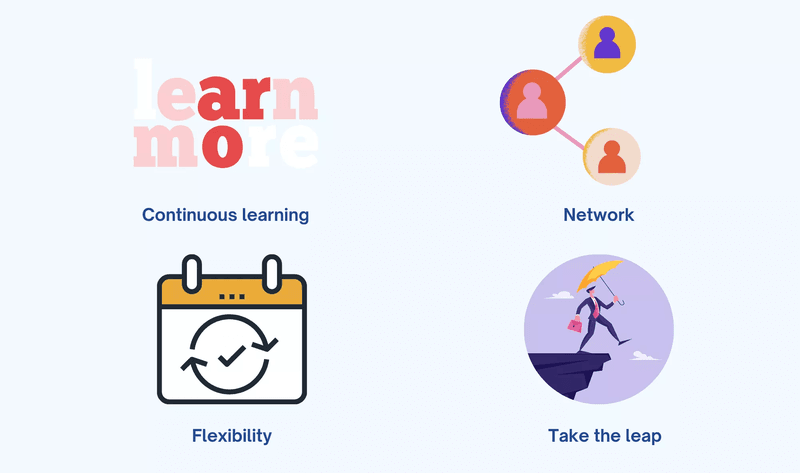
Similar to changing your career trajectory, a career path is when you plan your professional trajectory in the future.
People either plan their career paths years in advance or stick to their plans.
However, some might decide to take things one day at a time. Here we look at some essential requirements for career paths today:
Continuous learning
The job landscape is highly dynamic today. One must always keep an eye on the skills in high demand and the courses that people are taking to remain relevant.
Network
It is always good to remain in touch with professional colleagues. Also, one must try not to burn bridges with their previous organizations or bosses. You never know where the next opportunity is coming from.
Flexibility
One must always keep an open mind regarding their career plans. Any new project could result in a life-changing moment professionally. It is ok if things don’t make sense now. Hence, it is good to keep reminding oneself of Steve Jobs’s golden words:
You can’t connect the dots looking forward; you can only connect them looking backwards. So you have to trust that the dots will somehow connect in your future.
Take the leap
If a role in another team at a lower position provides you with a chance to develop new connections or acquire new skills, do not hesitate to take it up. Go ahead and seize the day.
What Career Paths Can You Take?
Here we list several industry paths to help you make your choices with solid information before moving to a particular industry:
- Basic industries
- Broadcasting
- Business services
- Capital goods
- Commercial banking
- Consumer Services
- Energy
- Healthcare
- Industrial Machinery
- Life Insurance
- Major Banks
- Major Pharmaceuticals
- Metal Fabrication
- Non-durable consumer goods
- Oil and gas
- Packaged Foods
- Precious Metals
- Real State Investment Trusts
- Transportation
If you are indecisive about the area, you want to work. Here we list a few functional career paths:
As more industries are published on the website, we will keep updating the list for you.
How To Choose A Career Path?
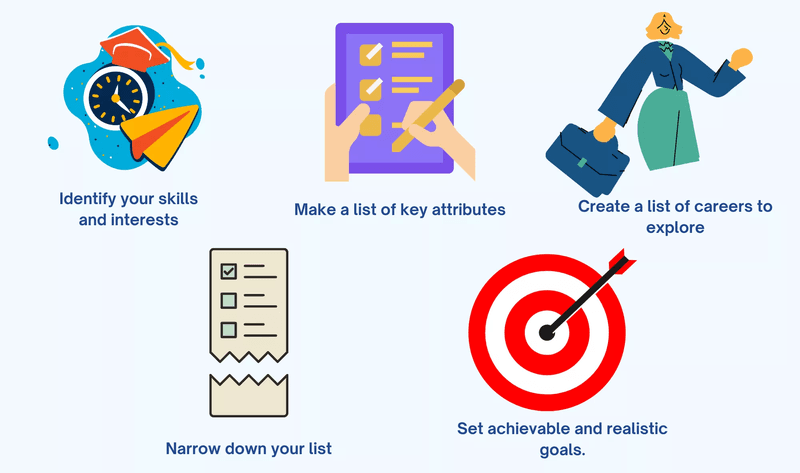
There are several steps involved in choosing a career path. Let us look at each of them briefly here.
Identify your skills and interests.
There is a greater chance of finding a fulfilling career if it aligns with an individual’s skillset or interests. As we have already mentioned, a person spends most of his time at his job. This makes it essential that the work he does is fulfilling.
Firstly, one must assess himself and understand the depth and breadth of his skills and knowledge. Interest is also a key component here. If one is interested, he can always acquire the necessary skills.
Make a list of critical attributes.
Once you have identified the skillsets and interests, it is time to take the next step. However, like every other step, careful evaluation is crucial here. The approach that we recommend is to divide this list into two parts – must-haves and nice-to-haves.
Jot down the key attributes you are looking for in your career path. This will help you gain clarity about your priorities. Thus it will make your choice a little bit easier.
This list will have questions like:
- How much money do you want to make?
- Are you seeking certain benefits, such as health insurance or extended parental leave?
- Do you have location restrictions?
- What is the kind of work environment that you thrive in?
- Willingness to travel for work
There could be many more questions on this list. The sample above serves as an ideal starting point.
Create a list of careers to explore.
Now that you know what you are looking for in your career, it is time to draft a long list of jobs that you are looking to explore. There are several ways to do this, such as reaching out to your professional network.
You can also divide this career list into several small parts, such as creative or science careers. Another way of dividing the list could be through job sectors. This way, the list could be broadly divided into private, public, and not-for-profit sectors.
Conduct research on various industries. The more you research, the more likely you are to chance upon fascinating careers across industries that you weren’t aware of earlier.
For instance, if you love following sports and crunching numbers. Sports analytics is a thriving field and has its fair share of opportunities.
Shortlist around 10-15 jobs. Once that is done, measure each position on multiple parameters such as:
- Employment outlook
- Entry requirements
- Career development
- Job requirements
- Working conditions
- Salary and Perks
- Related jobs
Narrow down your list.
How to choose a career path? Research, you can select 4-5 careers that match your interests, skills, and qualifications and trim that list. You can always enhance your capabilities as you discover more about your desired career. Understanding the day-to-day responsibilities in each of your dream jobs is also essential.
It is also essential to know the entry requirements and the job outlook for each career path shortlisted. Reading about the latest industry trends and newspaper reports will help.
Set achievable and realistic goals.
Now that you have noted your future career paths, it is time to break them down into small achievable targets. It is best to divide the career journey into small, medium, and long-term goals. This way, you can feel good about yourself after completing each mini-milestone.
An example of a short-term goal is polishing the first draft of your resume. A medium-term plan could be completing level 1 of the CFA exam.
The list of targets here needs to be flexible. This is essential as you may reach a point where your current career path is not aligned with your goals.
How to Choose a Career Path Quiz?

A career test or quiz helps you figure out a career that is suited for you based on various aspects such as:
- Interests
- Work activities
- Abilities
- Learning Styles
- Values
- Types of intelligence
So, the positive aspect of career tests is that they are objective. That way, you avoid the judgment of your family, friends, and peers.
However, no career aptitude quiz will guarantee you a dream job. Instead, they are meant to act as a guide to your working style. They will also help you know about your preferred work environment.
Any personality or career quiz works on the concept of correlation. As you answer more questions, they will add or subtract your overall score, which later connects to a particular result.
Career quizzes contain anywhere between 5-50 questions. These questions can be worded in several ways and test the consistency of your answers.
Some tests are designed to give specific job options, whereas others provide a broader sense of direction regarding job profiles that would suit you.
A few popular career quizzes are:
123 Career Test
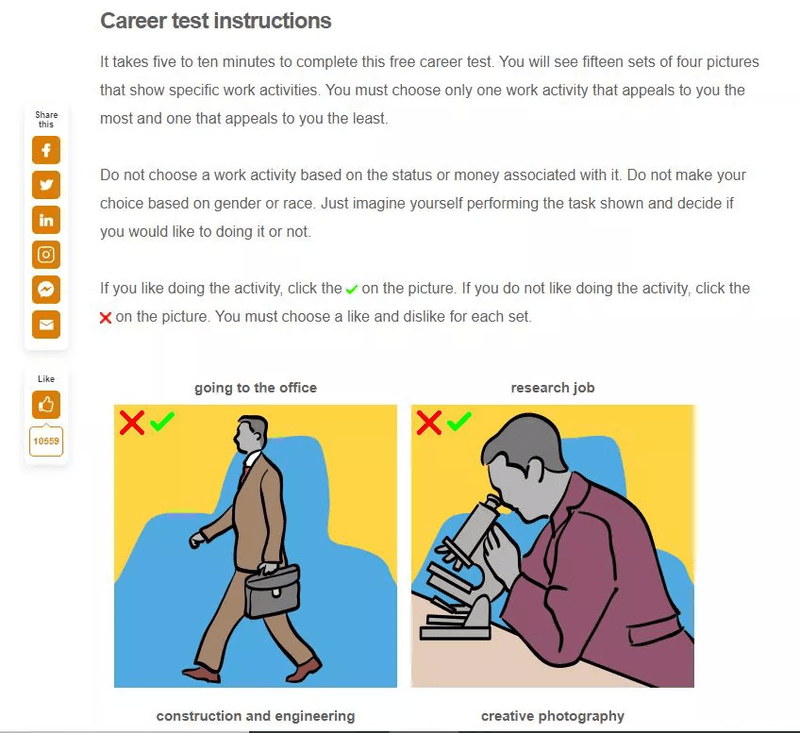
As discussed here, choosing a career that matches your personality is vital. The 123 career test is a lucid ten-minute assessment focusing on your work personality.
The test is in 15 questions that have four pictures each. You will have to choose one image you like and one you don’t in each question. The final results are in the form of Holland Code personality types.
The Princeton Review Career Quiz
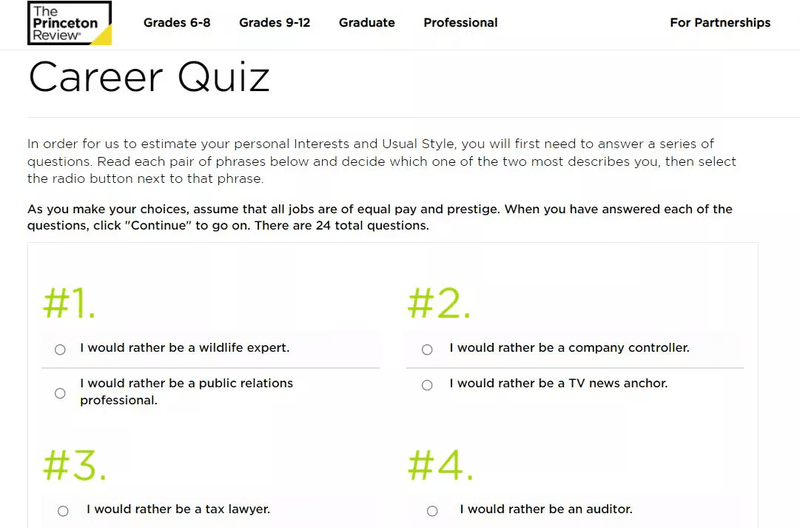
This test contains 24 questions and gives you detailed answers along with advice. The test has questions in the ‘II would rather be’ format, such as ‘I would rather be a teacher.’ or ‘I would rather be a lawyer.’ Another example could be – ‘I would rather have a field job’ or ‘I would rather have a desk job.’
You are assigned a color based on your style and interest at the end of the test. Style is how you choose to work and get results, and interest refers to the factors that keep you motivated at work.
You will be bracketed into one of four categories: Expediting, Planning, Communication, and Administration.
My Next Move O* NET Profiler
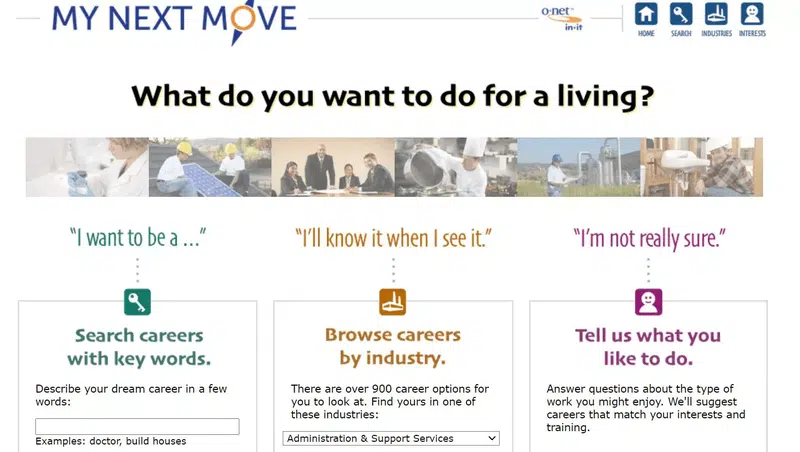
This is a test sponsored by the US Department of Labor. It is a 60-question quiz that focuses on different work duties.
The answers range from enormously like to dislike intensely. This test identifies your interests and suggests career paths based on your answers. Furthermore, unlike other quizzes, you can review and change your answers.
How Is a Career Path Different From a Job?
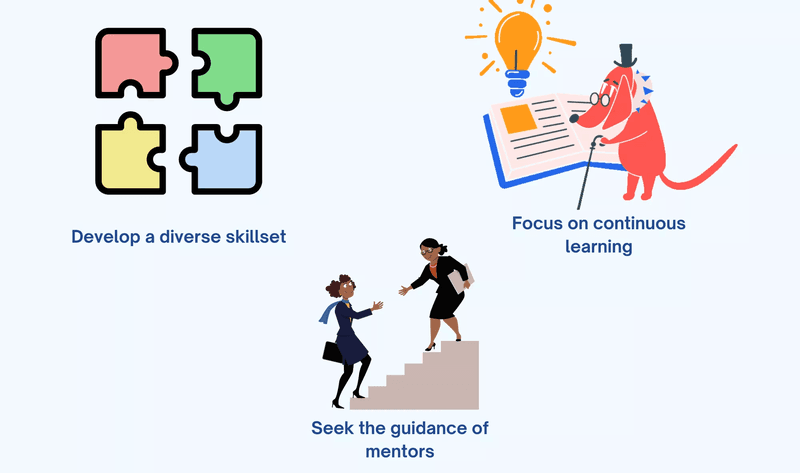
A job is something that you perform or undertake to earn your livelihood. Money is the primary motivating factor for a job, whereas passion, an interest in building something, and establishing yourself are the fuel behind crafting a career.
A career is something that you are involved in for the long term. It prioritizes experience overpay. The jobs that you hold throughout your life make up your career.
These jobs could be in the same department and the same organization. This was considered a career in the traditional sense of the word.
Develop a diverse skillset.
But careers include all the jobs, training, courses, and certification a person has obtained over time.
Each job helps you build soft skills such as teamwork, handling demanding customers, developing your writing skills, being a part of negotiations, etc. These valuable skills are helpful across the board in any industry.
Focus on continuous learning.
Always work on building your knowledge and enhancing your skills. You can do this via courses, formal training, on-the-job learning, certifications, etc.
You need to know the skills that will help you break into a new sector or benefit your career the most. Connect with colleagues with similar occupations in the industry and seek their advice.
Seek the guidance of mentors.
You must also look for people who have followed your desired career path and see if they can become your mentors. It is essential for mentors to be strict, ask difficult questions, and gently prod you toward your career goals.
Review the progress of your career with your mentors regularly.
Attend conferences, workshops, and seminars to build a professional network that you can reach out to. It will help you a great deal in your career development.
Finally, you may have to endure one or two bad jobs throughout your professional life. But your career must align with your values and goals.
How to Change Your Career Path?
Changing your career path is similar to choosing your career path for the first time, but with a few more steps:
1) Decide The Industry Or The Field You Want To Change Your Career
Brainstorm some careers, and research them. Consider the information to assess your following field or industry. Research job positions and salaries available in the industry. Also, what will be the efforts needed to become a good professional on this new path?
People have many reasons to change their career; either they don’t like their current one or have a desire for another position in the past. Make sure you identify yourself with your potential future career, which is more important than any other factor listed above.
2) Make a Plan
A career development plan is essential for reaching your goals. The plan should include educating yourself in the new career, creating your personal branding to achieve a good position, a timeline, your short-term and long-term goals, and other details you want to reach.
3) Rebrand Yourself
This is all about promoting yourself with a good plan. Start creating a blog, adjust your networks, and find events for giving speeches, among other ideas that would help you.
4) Network
Get in touch with people that will introduce you to professionals in the same field. Network means starting a professional conversation with your neighbor (this will help you, too!), going to industry events, reconnecting with old friends from your college or past companies, or cultivating professional friendships with professionals you are currently talking to.
Remember that anyone can help you connect with someone from your future career field. You just need to find the right opportunity to ask.
5) Take Action
Many professionals procrastinate their decisions, which is typical for any human being. Don’t do that! It’s never too late! Take action, and you don’t want to regret not doing it.
Make Your Decision
A career is a journey that requires a combination of knowledge, skill, tact, and effort.
Like every journey, it is a roller coaster ride with ups and downs. However, it is crucial not to lose sight of the larger picture and constantly work towards it despite setbacks.
Choosing your career path will never be an easy choice since it’s a decision that will influence your whole life, so why not take a few minutes to re-read this article and make sure you make the right decisions in your career?
Conclusion
So, step ahead, leave the excuses behind, and embrace the unpredictability. By risking it, you can only achieve the heights you’ve always wanted to accomplish. After all, it needs to be a blend of improving yourself and efforts to be noticed by the right people.
Remind yourself to have a goal and stick to it, adjusting when necessary. If you want to start right, be good at being the specialist everyone trusts. Then you will be able to learn related items step by step and gradually.
To learn new skills and take your chances, think outside the box. It may look jargon, but how will you know more than anyone if you’re doing the same things as the others? How would you be able to outperform if you were not innovating? Analyze how your career trajectory has been going on and trace your future career path.
Make your career plan. Define your career goals and what point you want a reach at your professional and personal levels. Stick to it, measure your accomplishment and mistakes, adjust when necessary, and do what it takes to reach your goals.
It is a self-explanatory point, you might think, but it is something that people often fall out of touch with. They tend to forget, willingly or subconsciously, that although other factors affect your career growth, the underlying reason is always the choices you’ve made.
Be it the choice of the niche you wish to become perfect at, the workshops you choose to attend, a mentor to guide you for better opportunities, or taking up new projects or letting go. Every one of these decisions adds up to take you forward.
Hence, you have to realize that no one will walk the hard steps for you, and no one will make the choices. Only you will make the choices, and only you will reap the rewards or suffer the consequences.
And last but not least, have your plan, adapt when necessary, and enjoy the journey. A mentor can help your guidance during the journey, but it’s up to you to make the efforts required to get there.

Ranu Kumari is a Professional Writer and a Marketing enthusiast who currently runs her own Marketing Consultancy, LatitudeBOX. She has written promotional articles for multiple brands and has published her work in Scopus indexed journals. She is passionate about expressing her thoughts and ideas to connect with her readers in a voice that they understand.

so much good information here, : D.
Greetings! Very useful advice within this article! It is the little changes that produce the most important changes. Thanks for sharing!
I appreciate your tips on how to have a work-life balance when working from home. As a reminder for the future, I write these tips down.